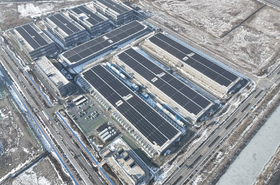The Chinese central government has told local municipalities that they should prevent the "blind and disorderly development" of data centers.
The National Development and Reform Commission and other four departments said that it was crucial to get power-hungry data centers under control if the country was to meet its target of hitting peak carbon emissions by 2030 and be carbon neutral by 2060.
"Data centers and 5G are... the most critical link when it comes to saving energy and reducing consumption of new infrastructure," the commission said.
"All localities must strengthen overall guidance for the construction of data centers, and resolutely avoid the blind and disorderly development of data centers," it added.
Local governments are told "in principle" not to provide incentives to data center companies to build facilities in areas that aren't classified as national hubs by the government.
The commission also said that data centers should shift non-latency sensitive workloads from China's heavily populated eastern region to the west, where renewable energy sources are more abundant.
An April report by Greenpeace found that China's cloud and data center operators are mostly powered by coal, and that companies fail to disclose how they plan to improve matters.
“China's Internet sector is powered primarily by coal, and the industry's energy consumption continues to rise," said Greenpeace East Asia climate and energy campaigner Ye Ruiqi. "Over the past year, more Chinese companies have begun to procure renewable energy and to disclose greenhouse gas emissions data. However, the pace of clean energy adoption is not nearly fast enough, especially when we consider that China’s biggest tech company, Alibaba, and its biggest independent data center operator, GDS, have yet to issue renewable energy or carbon neutrality commitments.”
A month later, the environmental group found that electricity use by data centers and 5G base stations in China will grow by an estimated 289 percent between 2020 and 2035.
“Internet companies in China must commit to achieve 100 percent renewable energy and carbon neutrality across the supply chain by 2030. At the same time, policymakers can help enable this transition by mandating the use of 100 percent renewable energy and providing financial incentives for companies to shift to wind and solar. Digital technology should be a solution to the climate crisis, not a growing source of emissions,” said Ye.
In July China published a three-year-plan for the data center industry, demanding that new facilities become more efficient, have a PUE of 1.3, and have a utilization of 60 percent by the end of 2023.




